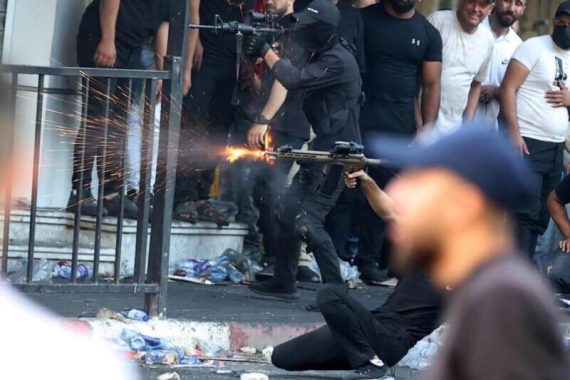T
hanks to the Iraqi army, the Palestinian city of Jenin was not captured in 1948 when Israel was created. The Iraqi army was able to retake the city, and the dozens of graves in the Iraqi Army Martyrs’ Cemeteries bear witness to the battle that took place there against armed Jewish militias, which eventually lost control of the city. But in 1967, Jenin was captured when Israel “finished the job” and occupied the West Bank, the Gaza Strip, Sinai, and the Golan Heights in the Six-Day War.
Just outside the city of Jenin, a refugee camp was built in 1948 and became home to thousands of Palestinian refugees who were expelled at gunpoint when Israel was created. In 1967, more Palestinians were driven from Jenin into Jordan, becoming refugees for a second time. Mornings in Jenin is a novel by Palestinian writer Susan Abulhawa that tells the story of a Palestinian family from the village of Ein Hod, near Haifa, who became refugees in Jenin in 1948. The scenes of Palestinians leaving the refugee camp en masse on July 4 was a stark reminder of the Nakba.
Jenin is more than a Palestinian refugee camp. It is a symbol of the refugee issue and of the defiance in the face of Israel’s expansion; in 2005, Israel withdrew from the Hermesh settlement near Jenin when it also decided to withdraw from the Gaza Strip. The right-wing Israeli coalition led by Benjamin Netanyahu decided to legalize the settlement as part of its drive to expand settlements and annex parts of the West Bank, namely Area C, which makes up 60% of the territory. In the eyes of Israel’s most right-wing government, the 2005 disengagement from Gaza and parts of the northern West Bank was a strategic mistake that needed to be reversed.
Area C and taming Jenin
For this reason, and to pave the way for Israel’s plans to annex Area C of the West Bank, the Israeli army has launched a campaign targeting the Jenin refugee camp in the West Bank. Over the past year, Israel has carried out repeated incursions into the refugee camp, killing dozens of Palestinians. For Israel, the crushing of any Palestinian resistance is a precondition for its annexation plan. For the first time since 2002, when Israel razed the Jenin refugee camp to the ground, the Israeli army used drones and helicopters to demolish dozens of Palestinian homes, calling the incursion “Operation Home and Garden.”
Ironically, Operation Home and Garden left many Palestinian homes and gardens in Jenin in ruins. Israeli bulldozers deliberately destroyed roads, targeted media and medical crews, and forced thousands of Palestinian refugees out of the camp after threatening to bomb their homes. In this manner, Israel announced the start of the second phase of the operation in which it plans to target every single house in the refugee camp and capture or kill Palestinian armed men inside the crowded refugee camp. So far, the Israeli operation in Jenin has killed 12 Palestinians and injured 100 others, 20 of whom are in critical condition.
The Israeli army will extend its operations to other towns and refugee camps in the West Bank—Jenin is just the beginning. The Israeli government is determined to confiscate more Palestinian land, demolish more Palestinian homes, and give the green light to Israeli settlers to carry out more pogroms against Palestinian towns, as happened recently in the West Bank towns of Huwara and Turmus Ayya.
International silence
As we have seen in the past, Israeli violations in the West Bank and Jerusalem are unlikely to remain there: Gaza will join the escalation, threatening another Israeli war in the coastal enclave. In fact, Palestinians have begun protesting at Gaza’s eastern borders in solidarity with Jenin, burning tires and demanding action to end the Israeli incursion into the refugee camp. Palestinian factions in Gaza are likely to target Israel, and other Palestinian cells in the West Bank are expected to target Israel, Israeli settlers, and the Israeli army in response to the events in Jenin, leading to further escalation on the ground.
Without international intervention to stop the Israeli escalation in Jenin, another war is in the making this summer, just like what happened in May 2021 and May 2023. The U.S. and UK governments see Israeli actions as part of “Israel’s right to defend itself,” while a number of Arab and Muslim countries are content with issuing statements of condemnation, reducing the pressure on the Israeli government which enjoys total impunity. Speaking in numbers, Israel has killed 193 Palestinians since the beginning of the current year.
The Palestinian Authority says it has stopped security coordination with Israel, a move that was announced repeatedly in the past, in response to what is happening in Jenin, but the Israeli government claims security coordination is ongoing. Nowadays, the vast majority of Palestinians have lost all hope that peace talks with Israel could lead to the establishment of a Palestinian state. Indeed, Netanyahu has never been clearer that Israel will do everything in its power to prevent the establishment of a Palestinian state, and that allowing the Palestinians to have a state is a strategic threat. Netanyahu recently declared that Israel must “crush” Palestinian statehood ambitions.
Recommended
Jenin is the only the start
Palestinians on the ground know only too well that Israel will never leave the West Bank and will only expand there. They also knew back in 1993 when the Palestine Liberation Organization (PLO) and Israel agreed to establish a Palestinian state “within five years,” it was simply a trap and that Israel would never have allowed the Palestinians to have their own sovereign and independent state. All the Palestinians can aspire to is a couple of mayorships outside Area C of the West Bank, without any political representation or rights. The Israeli invasion of the Jenin refugee camp, and probably other West Bank towns, is proof of this.
In Israel’s eyes, Palestinians are merely cheap laborers that can build Israeli cities and settlements, and granting them full rights is out of the question. For Palestinians with Israeli citizenship, who make up 20% of Israel’s population, all that is in store for them is more violence and crime that will eventually force them to leave, without the Israeli police ever intervening to make any arrests. What is certain, sadly, is that there are worse days ahead for the Palestinian people and that their conditions will only get worse under Israel’s continuing military occupation: Jenin is only the beginning.





